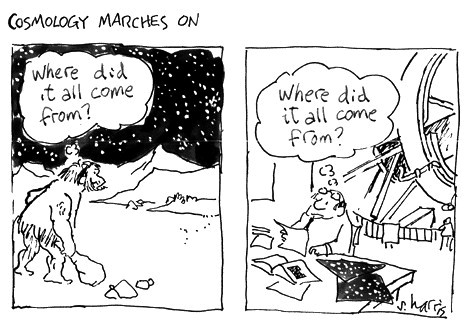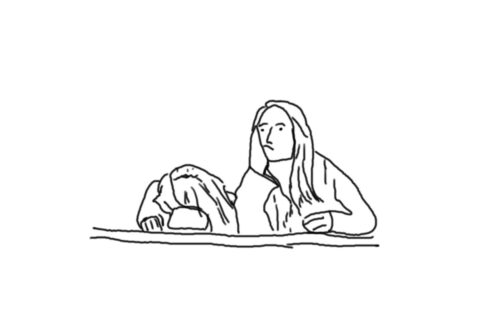Adams writes “to refute two…objections to the doctrine of divine necessity” (742). In doing so, he provides a refutation for evolutionary naturalism and an argument for the existence of God.
Obj #1: The proposition, ‘God exists’, cannot be a necessary truth because only analytic truths can be necessary truths but existential propositions cannot be analytic truths. ‘God exists’ is an existential proposition. Therefore, ‘God exists’ cannot be a necessary truth.
Why think analytic propositions cannot be existential propositions? An analytic proposition is a conditional the consequent of which is a correct analysis of the antecedent. For example, the proposition ‘if he is a bachelor, then he is unmarried’ (or ‘all bachelors are unmarried’) is an analytic proposition. Due to their conditional nature, analytic propositions do not imply existence. ‘If he is a bachelor, then he is unmarried’ is true even if there are no bachelors to be found.
Resp: Adams argues that not all necessary truths are analytic. Necessary truths are propositions the denial of which entail a contradiction. However, we cannot explain what necessity is without circularity. Saying that necessity is explained by the contradiction fails to explain anything more than the contradiction itself. This is also true of analyticity:
“No doubt all the theorems of a good or valid or semantically satisfactory system of formal logic are indeed necessary truths. But it would be circular to appeal to this fact to explain what we mean by ‘necessary’ here; for what makes a system of formal logic good or valid or semantically satisfactory is at least in part the necessary truth of all its theorems.”
Adams asks us to consider three propositions:
(A) All husbands are married
(B) God is the creator of the universe
(C) Everything green has some spatial property
(A) is clearly an analytic truth. ‘Married’ provides a partial analysis of ‘husband’ (‘married man’ provides a complete analysis of ‘husband’). One might think that analyticity is to be explained semantically. What we mean by ‘husband’ is ‘married man’. But even though what we mean by God is ‘the creator of the universe’ this does not provide an analysis of ‘God’. It might have been the case that God refrained from creating the universe. We presuppose the additional notion of the necessity of (A) while not doing so when we consider (B).
Adams further claims that we consider (C) a necessary truth, but it is not an analytic truth. While there cannot be any such thing as a green thing without it having a spatial property, it is far from clear that ‘has some spatial property’ provides a partial or complete analysis of ‘green thing’.
Thus, Adams concludes, we cannot rule out existential propositions as necessary since we have not established a sufficiently precise analysis of necessity itself.
Obj #2: Necessary truths are conceptual in nature and do not have any bearing on the real world. The proposition, ‘necessarily, God exists’ has significant bearing on the real world. Indeed, it determines something about everything in the world. Thus, it cannot be a necessary truth.
Adams cites A.J. Ayer who confesses that if there are necessary truths that determine anything about the real world, then those truths cannot be gained by experience:
“we shall be obliged to admit that there are some truths about the world which we can know independently of experience; that there are some properties which we can ascribe to all objects, even though we cannot conceivably observe that all objects have them. And we shall have to accept it as a mysterious inexplicable fact that our thought has this power to reveal to us authoritatively the nature of objects which we have never observed” (Language, Truth and Logic, 73)
Resp: Adams takes Ayer to be suggesting that accepting that necessary truths that determine something in the real world entails accepting that objects not yet experienced come under those necessary truths. For Ayer, this entails an epistemological leap. However, Adams suggests that the same is true of abstract objects. We believe not only that modus ponens relates the propositions we grasp today, but those we will grasp tomorrow and those we will never grasp. What explains this feature of thought is the concept of necessity we are pursuing.
The upshot of Adams’ discussion is that Human beings have the ability to recognize necessary truths non-empirically. But what explains this ability?
Adams imagines an evolutionary account: Having true beliefs is conducive to human survival. As a species, we have acquired this ability from our ancestors and will pass it on to our progeny ensuring the survival of our species. Having access to mathematical truths has aided our survival in the past, and our continual growth in the field helps ensure our future survival.
Adams suggests, however, that the evolutionary account offers a less satisfying explanation for human knowledge of modality. There appears to be no evolutionary advantage to a belief that is necessarily true over a belief that it is plainly true.
Adams asks us to consider the following explanation:
“Suppose that necessary truths do determine and explain facts about the real world. If God of His very nature knows the necessary truths, and if He has created us, He could have constructed us in such a way that we would at least commonly recognize necessary truths as necessary. In this way there would be a causal connection between what is necessarily true about real objects and our believing it to be necessarily true about them. It would not be an incredible accident or an inexplicable mystery that our beliefs agreed with the objects in this.” (751)
Adams argues that such an explanation is the best explanation for human knowledge of necessary truths and an argument for the existence of God. Adams recognizes the Augustinian nature of the view. On this view, God necessarily exists and thinks all necessary and possible truths. This provides the best explanation for two plausible truths about necessities and possibilities: they are discovered and not created by human beings and they are thought by some mind. If God is the one who thinks those thoughts and God necessarily exists, then we are able to think them ‘after’ him.



One Comment
BD Result Online
SSC Result 2018 Bangladesh Education Board Result
SSC Mark sheet 2018 download